Saying no to someone with borderline personality disorder can be tricky. Enforcing boundaries can result in unpredictable reactions or “BPD episodes.” If you love someone with borderline personality disorder or have a spouse with BPD, you may regularly walk on eggshells and not know when you’ll see a glimpse of BPD’s rage or feel the effects of your loved one’s fear of abandonment. You might feel like you can’t do anything right or that you’re always setting them off. You might be emotionally exhausted and at your wits end, ready to call it quits.
Understanding BPD & “BPD Episodes”
When you don’t have the condition yourself, it’s hard to understand why your loved one with BPD has these explosive reactions when you go out without them, say no or otherwise assert your own boundaries. This “no” could be to a plan, an idea or a request. Whatever it is, you need help navigating how to say no to someone with borderline personality disorder.
You may believe your loved one is being dramatic, over-zealous or too sensitive. You may worry they’re being manipulative or controlling. You may wonder if they’re just abusive. In reality, it’s more likely their fear of abandonment and rejection has been triggered by your “no.”
When someone with BPD gets triggered, it can set off an overwhelming wave of negative emotions like shame and sadness. dead. These feelings are intense and can be incredibly hard to shake off.
(Read ‘What a Devaluing Split Looks Like for Borderline Personality Disorder‘)
Typically when someone with BPD experiences these intense feelings, they will make frantic efforts to avoid the real (or perceived) abandonment or rejection. Either that or they will protect themselves from further emotional pain by pushing you away or by pushing your buttons. This is simply a self sabotaging defense mechanism—the whole “I hate you, don’t leave me” stereotype, that accompanies people with borderline personality disorder, coming into play.
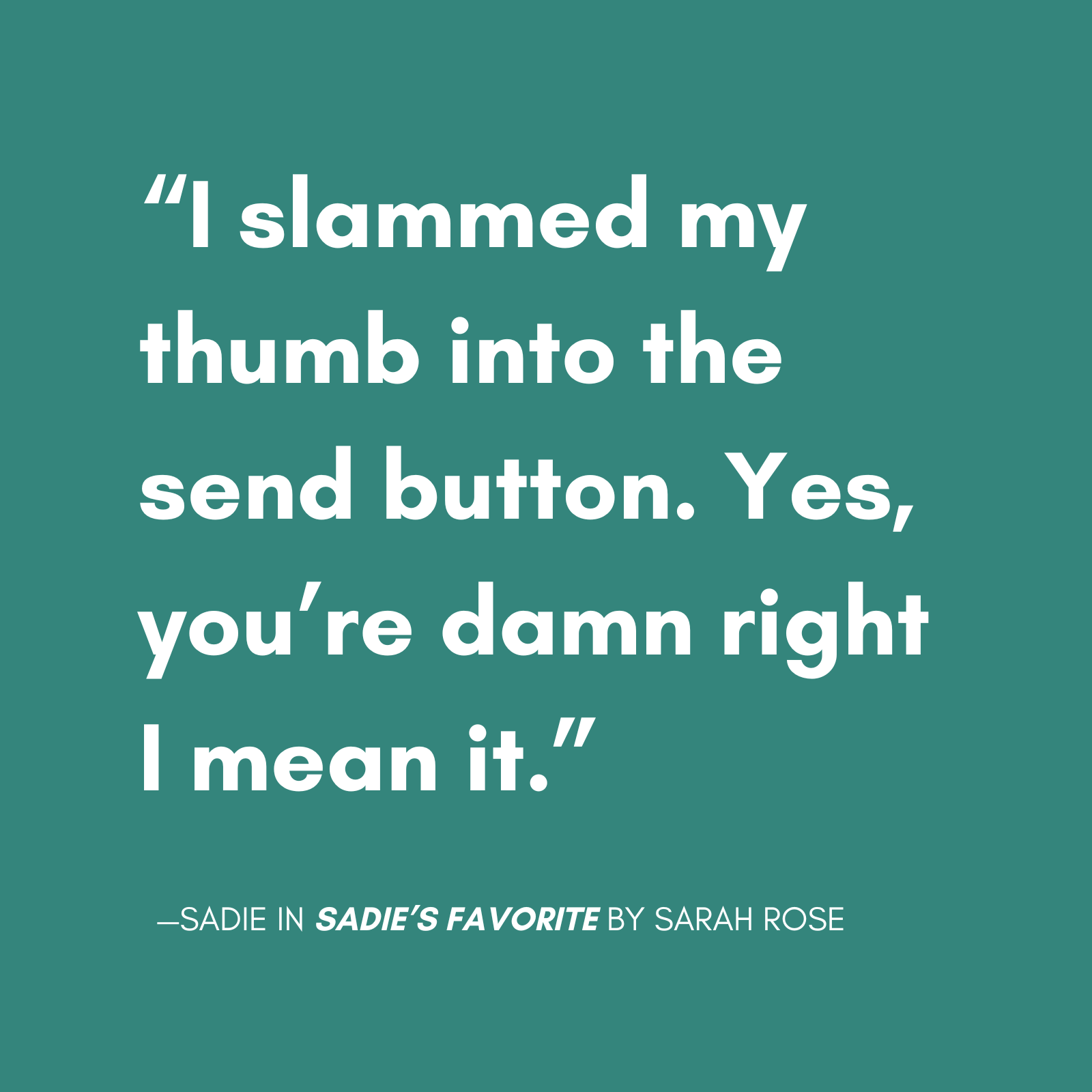
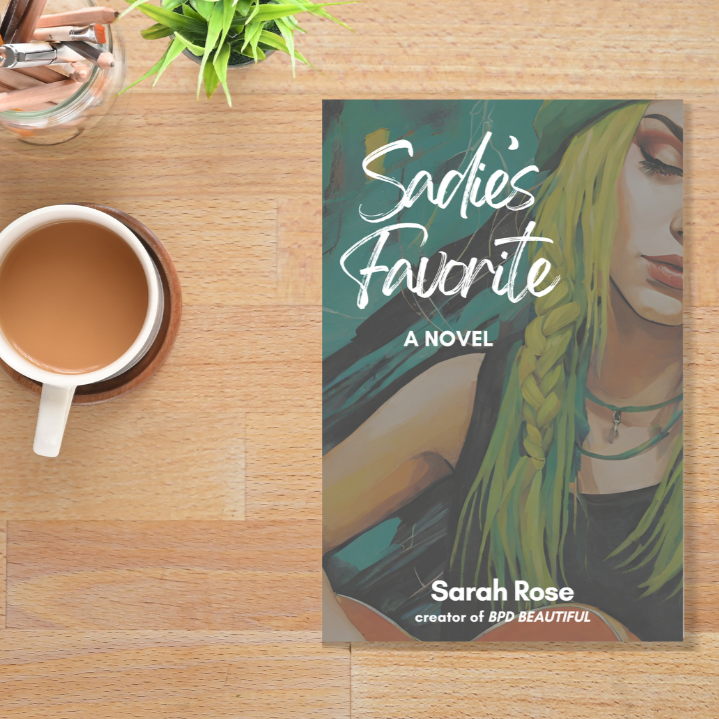
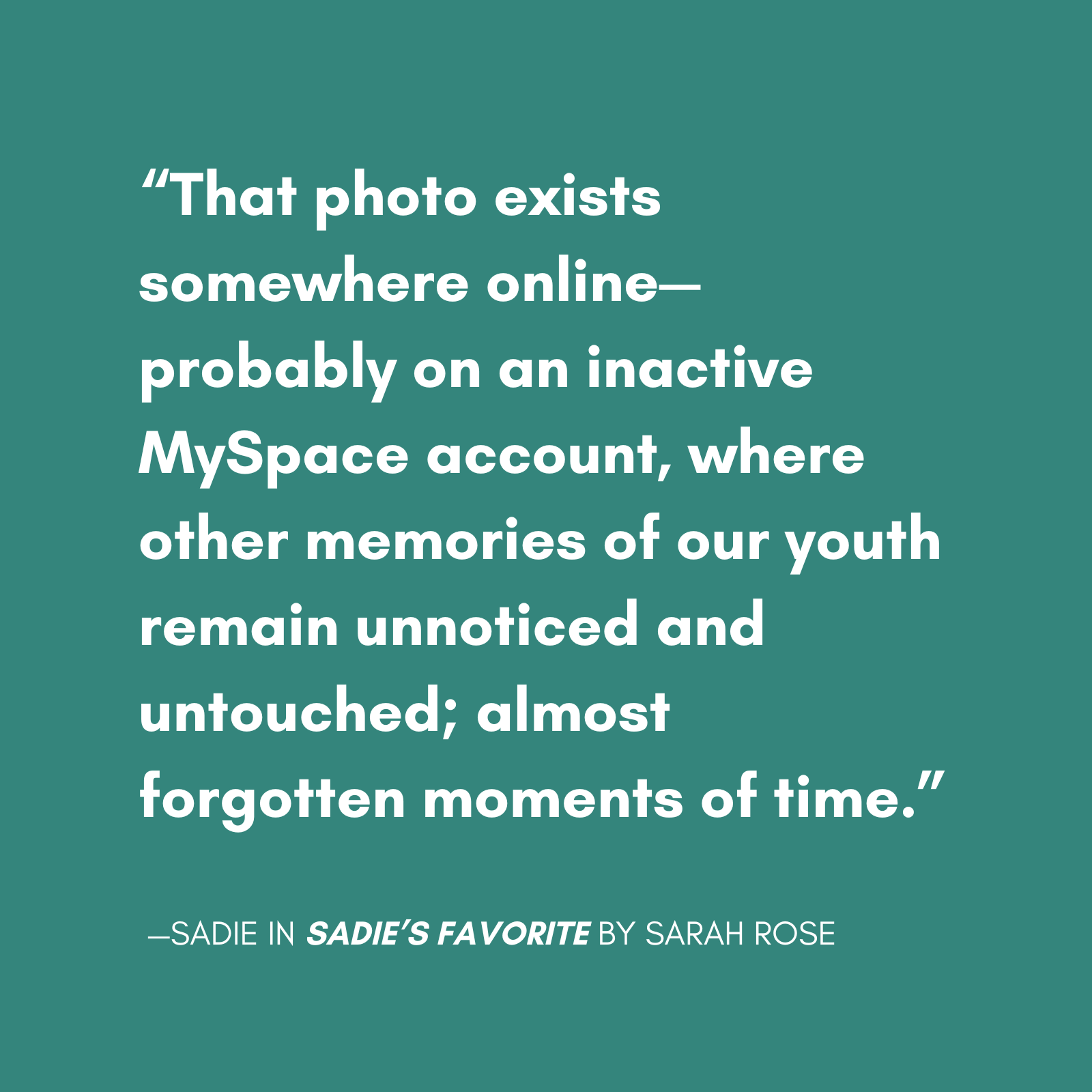
“READING [SADIE’S FAVORITE] IS AN EMOTIONAL ROLLERCOASTER.” -BETA READER
Sadie’s Favorite by BPD Beautiful creator Sarah Rose tells the story of a girl lost, a woman recovered and the trauma in between.
Describing in words how intense the feelings are when you have BPD and your fear of abandonment has been triggered is nearly impossible. I’ve tried many times to describe a “BPD episode.” But I’ve always fallen flat or ended up sounding disingenuous or incomprehensible.
(Read ‘What Happens During a BPD Episode’)
Just know that if you don’t have BPD, you will never fully understand. It’s also invalidating to pretend to understand just because you’ve read a few blog posts or watched some videos on YouTube. Even still, it helps to do your research and be educated about it.
I will say that in my experience—the feeling of impending abandonment starts in your chest and immediately drops to your stomach. Your heart starts to race and your confidence suddenly erodes. Feelings of inadequacy and a sudden but familiar core belief that you’re unloveable & unworthy can become so overwhelming, they can be hard to ignore or move past.
Your feelings can then quickly consume your thoughts and your physical being, causing more physical symptoms like nausea or dizziness. You might dissociate and feel like you’re out of your body. Your thoughts can then quickly become distorted or delusional. After it gets to this point, you may start to feel like an animal who’s been trapped in a small cage for years and years. That’s where the BPD rage comes in. Or for those with quiet BPD, they may shut down completely and be unable to communicate, move or feel anything.
If you have ever suffered with a panic attack that left you incapacitated or on a self-defeating path of self-destruction, you’ll have a much better idea of what your borderline loved one suffers through on a daily basis than someone who’s never experienced anxiety, depression or another mental illness.
But even then. You’ll never actually know. So again, don’t pretend to. Don’t say, “I understand.” Instead, say, “I want to understand.”
What Are BPD Triggers?
A borderline’s fears of abandonment & rejection can be triggered by things like…
- Unexpected delayed response to a text
- Not getting a text back at all
- Canceled plans
- Being left out of a conversation or event
- A backhanded comment
- Partner going out without them
- Having their ideas or requests rejected
- Offering help or support but being told no
- Being told no when asking for help
- Being reminded of a past trigger
Small things that most people wouldn’t bat an eye at can trigger someone with borderline personality disorder. As a person with BPD, I know this is true.
So what’s a loved one to do? Bend over backwards to try and appease them? Never say no? No, of course not. (It’s healthy to have boundaries in relationships. Your loved one with BPD may not like them, but they do need to learn how to accept your boundaries if they want to have a healthy relationship with you.)
Instead of walking on eggshells, you want to learn how to validate their feelings (validation is NOT blind agreement) and make sure you’re saying no to someone with borderline personality disorder in a way that won’t trigger their fears of abandonment and rejection.
Keep in mind: doing this is much easier when your loved one is onboard with strengthening and/or fixing themselves and your relationship. The tips below are also more effective if your loved one openly acknowledges their BPD diagnosis, is in treatment or is willing to seek an evaluation with a professional.
Saying No to Someone with Borderline Personality Disorder
Here are some tips you can use when saying no to someone with borderline personality disorder – without triggering them. Of course, my advice is based on my own experience with BPD and may not work for everyone.
- Clarify if it’s a “hard no” (never happening) or a “not now” (will happen in the near future). The word “maybe” can be frustrating and anxiety inducing. Try not to use it. Be direct whenever possible.
- Give your side of the story. This can help lessen our feelings of abandonment or rejection. It can help us talk ourselves out of overthinking the situation or from taking it personally. Preventing both can ultimately help us focus on respecting your wants and needs (which are just as important!). So for instance, if you’re saying no to someone with borderline personality disorder because of your own anxiety over a certain activity, be open about your feelings so your loved one with BPD can better see things from your perspective instead of getting stuck in their own emotions.
- If your no is actually “not now,” suggest a few alternate days or times. This helps your loved one remember that they still matter and it shows that you care about them just as much as they care about you. It also lessens the blow of disappointment and gives them something to look forward to.
- If your no is a “hard no”, try to come up with an alternative idea, plan or compromise. But only if it’s possible, realistic and if you want to. Don’t ever do something just because you feel forced to do it. That will only hurt both of you in the end.
- If they seem to be getting upset or are becoming passive aggressive, ask your loved one how they’re feeling. Expressing this can help your loved one let off steam. It could also help you come up with a better alternative together that would work for both of you. A good rule of thumb when it comes to communicating with people who have BPD is to focus on their feelings, not necessarily their words or actions. Focus on their feelings because that is what they will naturally be focused on….the intensity of the borderline amplified feelings.
- Reassure your loved one that your reason for saying no has nothing to do with them as a person nor does it change anything about your relationship or your love for them. Even if you’ve already told them your reason for saying no, sometimes it’s not enough to just know the why (especially if you’ve been fighting over your no). Reassuring your loved one of your love can help them better manage their BPD influenced emotions and thoughts.
- Remind your loved one of how much you love them. This goes hand in hand with the tip above. Both tips said together can make a huge difference.
- Be in the habit of sticking with the plan or with things you say you’ll do. Try not to cancel, push the time back or not follow through as that can cause someone with BPD a lot of anxiety. If canceling or pushing back the time is a must, following the previous steps again could be helpful along with giving your loved one as much notice as possible.
- Above all else, be patient and consistent when saying no to someone with BPD. This may seem like a lot of work to assert a boundary. It is. It’s not easy for loved ones of borderline personality disorder. But with lots of patience, consistency, time & professional help—I do believe there’s hope for BPD relationships. Also, from personal experience, having a boundary consistently asserted helps a lot. It decreases the intensity of the trigger and at times, eliminates the trigger altogether. Consistence helps us know what to expect.
I hope these tips can help you deal with your loved one’s BPD and say no to someone with BPD more effectively. I know it’s hard for you. I commend you for sticking by your loved one and trying to learn more about the condition. They are incredibly blessed to have you in their life!
(Read ‘How to Make Plans without Triggering Your Loved One with BPD’)
Remember to take care of yourself and assert your needs on a regular basis. Don’t be a doormat and don’t make excuses for your loved one. Supporting someone with borderline personality disorder is no easy feat and you matter just as much!
Saying No to Someone with Borderline Personality Disorder: FAQs
Here are some answers to common questions related to saying no to someone with borderline personality disorder. If you’re looking for answers to even more questions, check out our Top 30 Questions About BPD for Loved Ones post here.
What Happens When You Say No to a Borderline?
Saying no to someone with borderline personality disorder can be triggering and result in a BPD episode, more so if they’re not in treatment. Knowing how to say no to someone with BPD in a way that doesn’t invalidate them or trigger their fear of abandonment is key – especially if your loved one isn’t treating their BPD.

As a BetterHelp affiliate, we receive compensation from BetterHelp if you purchase products or services through the links provided.
Is it OK to Say No to Someone with BPD?
Of course it’s okay! In any kind of relationship (whether romantic, platonic, familial, etc) – it’s important that the needs of both parties are understood, validated and respected. Just because saying no to someone with borderline personality disorder can be triggering for them, doesn’t mean you shouldn’t say it if it means respecting your own needs and individualism. Do not ignore your boundaries for the sake of keeping the peace. That’s not fair to you, nor is it fair to the person with BPD (because it will only lead to you resenting them in the end).
Should I Feel Guilty For Saying No to Someone with BPD?
You shouldn’t feel any more guilty saying no to someone with borderline personality disorder than you would saying no to someone without it. When it comes to BPD relationships – your best bet is to be upfront, validating, reassuring and kind to the person with BPD.
What if the Person with BPD Gets Angry or Upset When I Tell Them No?
This is a possibility, especially if you’re saying no to someone with borderline personality disorder who hasn’t started treatment or who isn’t self aware. Your best bet in this case is to remain calm & patient, maintain your boundaries, reassure them that you care, retreat if they behave abusively (BPD is not an excuse) and be understanding of the fact that their angry likely has nothing to do with you as a person – it has to do with their fear of abandonment and sensitivity to rejection.
How Do Borderlines React to No Contact?
The first and only time a person went No Contact with me was in my freshman year of high school. It was from my first boyfriend, who was also my favorite person at the time. After we broke up, he stopped speaking with me. I did not handle it well. I called him relentlessly. Eventually he stopped answering and I gave up trying. I wrote him love letters I never sent, speaking on all of the good times and our “love” (admittedly, I didn’t know how to love at 14 – so I use the term loosely today). I hacked into his Myspace account and deleted the custom theme I’d designed and coded for him. I listened to sad music, isolated myself and trash talked him to anyone who would listen – even though, deep down, I knew he had done nothing wrong and it was all just a defense mechanism. I was hospitalized twice. I cut a lot and became suicidal. Thankfully, he went to a different school than me and I was able to get over him after a year or so. We were a couple for one year, which is a lifetime to a 13-14 year old girl. I was convinced I would never love again.
Other times, also when I was younger, I got into fights with my friends and we naturally phased each other out of our lives. While I didn’t react as strongly with them as I did with my first breakup, those instances still hurt deeply. I would ruminate on the fall outs, daydream about seeing them again, constantly switch (in my head) between playing the victim & harping on my own actions that led to the fallout. I would also obsessively stalk their social media until I eventually got over it. It usually took a couple of months, sometimes longer if we were really close.
No Contact can trigger a person with BPD’s fear of abandonment. It can cause them to switch between lashing out & raging to crying & begging – often a result of BPD splitting. Keep in mind, if they have a more quiet subtype of BPD, they may not show these intense mood swings to you directly. They may experience everything inwardly and seem totally fine to the outside world. They may become suicidal or self-destructive. They may need to be hospitalized. They may hoover you in a similar way as someone with narcissistic tendencies will (meaning they’ll reach out or find alternative ways of contacting you if they’re blocked), although the motivations behind this behavior tend to differ than that of someone with narcissistic tendencies.
(Read ‘Differences Between BPD & NPD’ on Choosing Therapy)
However, none of that means you shouldn’t go No Contact if the person with BPD is abusive towards you or is in other ways affecting your mental health. Sometimes No Contact is the best thing to do for yourself and even for the person with BPD (abandonment can sometimes push some people with BPD to seek help). Stick by your boundaries and block all forms of communication. If the person with BPD makes suicidal threats after you go No Contact, call the police to have them to do a well check or reach out to their parent or a teacher if you are minors. As sad as it is, it’s not your job to save them from BPD.
What Happens if You Ignore Someone with BPD?
Being ignored can easily trigger a person with BPD’s fear of abandonment and may cause them to split on you or themselves. If you’re close to the person with BPD and they feel comfortable expressing their feelings to you – they may react to this trigger outwardly by continuously reaching out. They may ask if they did something wrong or lash out at you. If they don’t feel comfortable expressing their feelings to you or if they have a quiet BPD subtype – the response can be much more subtle. They may repeatedly check their phone for a response or they may check your social media to see if you’ve been online. They may wonder what went wrong or ruminate on your interactions with them.
What Not to Say to Someone with BPD?
Generally – anything said that would invalidate someone is something to avoid if you’re looking to de-escalate a BPD episode or support a loved one with the condition. Some specific, invalidating phrases that you should NOT say to someone with BPD are:
- “You’re fine.”
- “It’s not a big deal.”
- “I don’t see the problem.”
- “You’re overreacting.”
- “Get over it already.”
- “You’re blowing this out of proportion.”
- “Oh my God, you’re so dramatic.”
- “You’re crazy.”
- “You’re unstable.”
- “You always make a big deal of things.”
- “Why are you so intense?”
- “Just stop.”
- “I don’t know why you can’t just let it go.”
- “Calm down.”
- “Are you still on this?!”
- “You take things way too personally.”
- “Here you go again, freaking out for no reason.”
- “You’re so intense. Chill.”
- “This is just your BPD speaking.”
- “Stop already!”
Honestly, you shouldn’t say the above phrases to anyone. They’re dismissive, cruel and not productive. Continuously saying these types of phrases to someone is also abusive.
Common BPD Myths vs. Facts
Here are some common BPD myths vs. the facts.
- BPD is untreatable. Actually, BPD is treatable and it even has a high recovery success rate. According to Perry D. Hoffman, Ph.D. of the National Education Alliance for Borderline Personality Disorder, research conducted by the National Institute of Mental Health shows that after two years, more than 50% of patients with BPD go into remission. After 10 years, more than 80% go into remission. 88% remain in remission. Source
- People with BPD do not ever change. I had a therapist tell me this once, before I got diagnosed – back in 2012. I’d read the symptoms of BPD online and realized all 9 of them resonated with me. “You do not have BPD. Borderlines don’t change. They don’t follow through on therapy,” she’d said. 8 years later, a different therapist and a psychiatrist disagreed and officially diagnosed me. If only the mental health world knew in 2012 what we know now, maybe I would have gotten diagnosed and went into remission much sooner. The point is, this is an outdated myth. While there are a percentage of those with BPD who will not seek treatment or get to a healthier place (sadly) – the vast majority of those with BPD absolutely can change, as long as they want the help and don’t give up trying.
- People with BPD are not self aware. Borderline personality disorder runs on a spectrum. So yes, you may run into someone with lots of BPD traits who seemingly has no idea what damage they’re leaving in their wake. But it’s not inevitable. I’ve met many people with BPD who had amazing and admirable self awareness and then, I’ve met the former.
- BPD develops in adulthood. BPD is usually diagnosed when someone is in their late teens or 20’s. This is because most mental health professionals are reasonably reluctant to diagnose a person with a personality disorder when their brain is still developing. However, most of the people with BPD that I’ve met or come across online have said their symptoms started in their pre-teen or childhood years. Personally, I remember my BPD symptoms coming to the surface by the time I was 11.
- People with BPD never take accountability. Never say never. Someone with BPD, especially one that is untreated, may struggle with apologizing or holding themselves accountable – much more so when they’re triggered. But that doesn’t mean it’s impossible for them to do so or that someone in remission can’t do it.
- People with BPD do not communicate effectively. They may not, if the person with BPD isn’t treated or hasn’t learned healthy communication skills, but generalizing a whole community of people isn’t the way to go about things. I’ve met handfuls of people with BPD who likely communicate better than those without a personality disorder or mental illness, and I’ve also met people with BPD who are lower functioning and can’t maintain healthy interpersonal relationships. It ultimately depends on the person and their level of self awareness and progress in recovery.
- BPD and NPD are the same thing. No, they’re not. However, they are both cluster b personality disorders so they do share some traits and have some overlapping symptoms. Regardless, they also have their differences. With that said, it is possible for BPD and NPD to be comorbid – meaning someone can be diagnosed with or have traits of both. Both conditions run on spectrums.
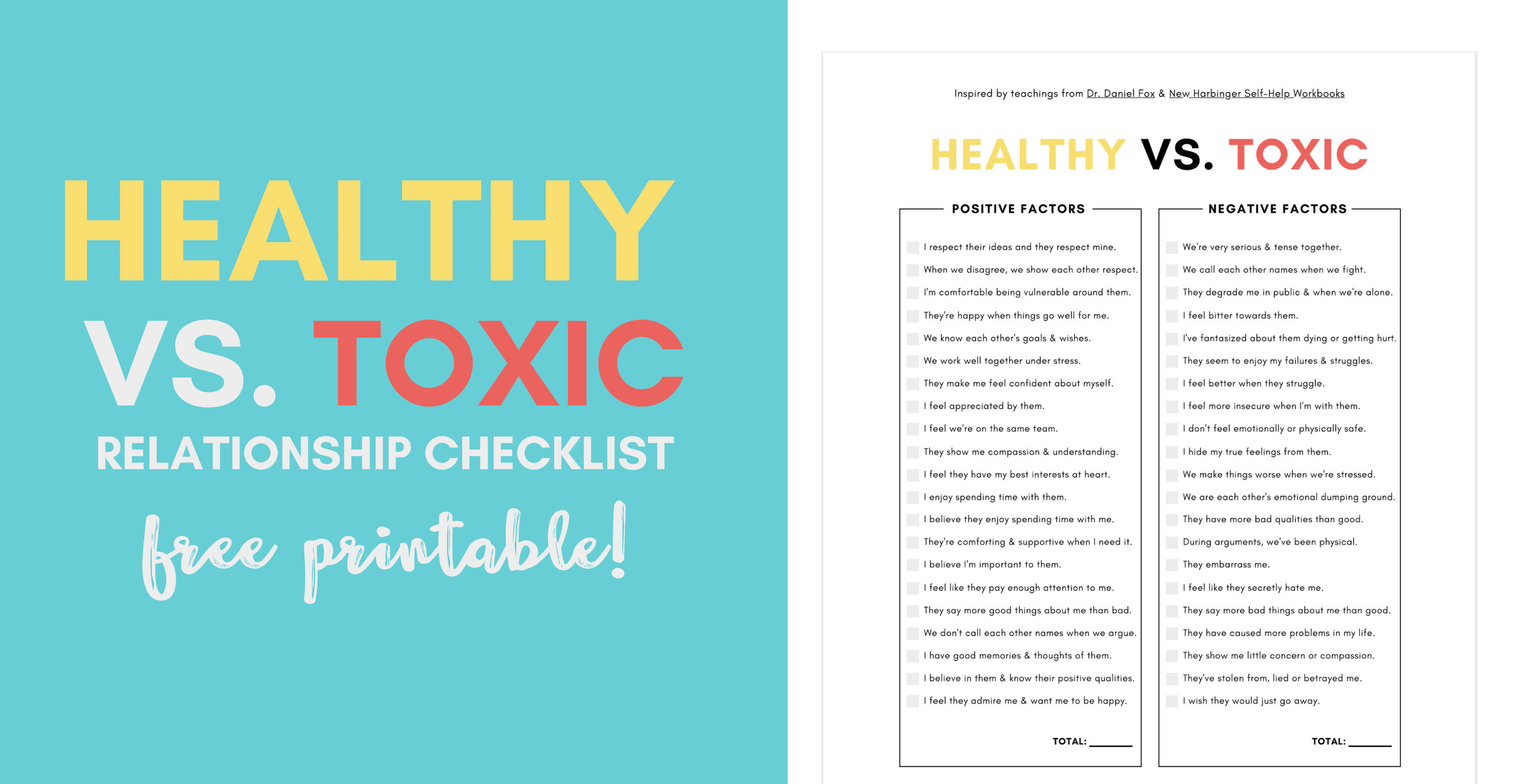
DOWNLOAD FREE PRINTABLE
Measure how healthy or unhealthy your BPD relationship is with the Healthy vs. Unhealthy Relationship Checklist.
BPD Resources
BPD Characters: Read the first 6 chapters of Sadie’s Favorite – an upcoming novel by Sarah Rose, creator of BPD Beautiful.
Get 20% off your first month of BetterHelp. Get matched with a licensed therapist within 48 hours. Subscriptions as low as $65/week, billed every 4 weeks. Cancel anytime.
Manage your BPD symptoms with a printable workbook.
See our recommended list of books about BPD.
Start a Discussion
Tell me your BPD relationship story or situation in the comments. Do you have trouble saying no to someone with borderline personality disorder because you’re afraid of their reaction? I’d love to hear from you!
Pin This Post
Liked this post? Please help support BPD Beautiful and spread BPD awareness by pinning it on Pinterest.
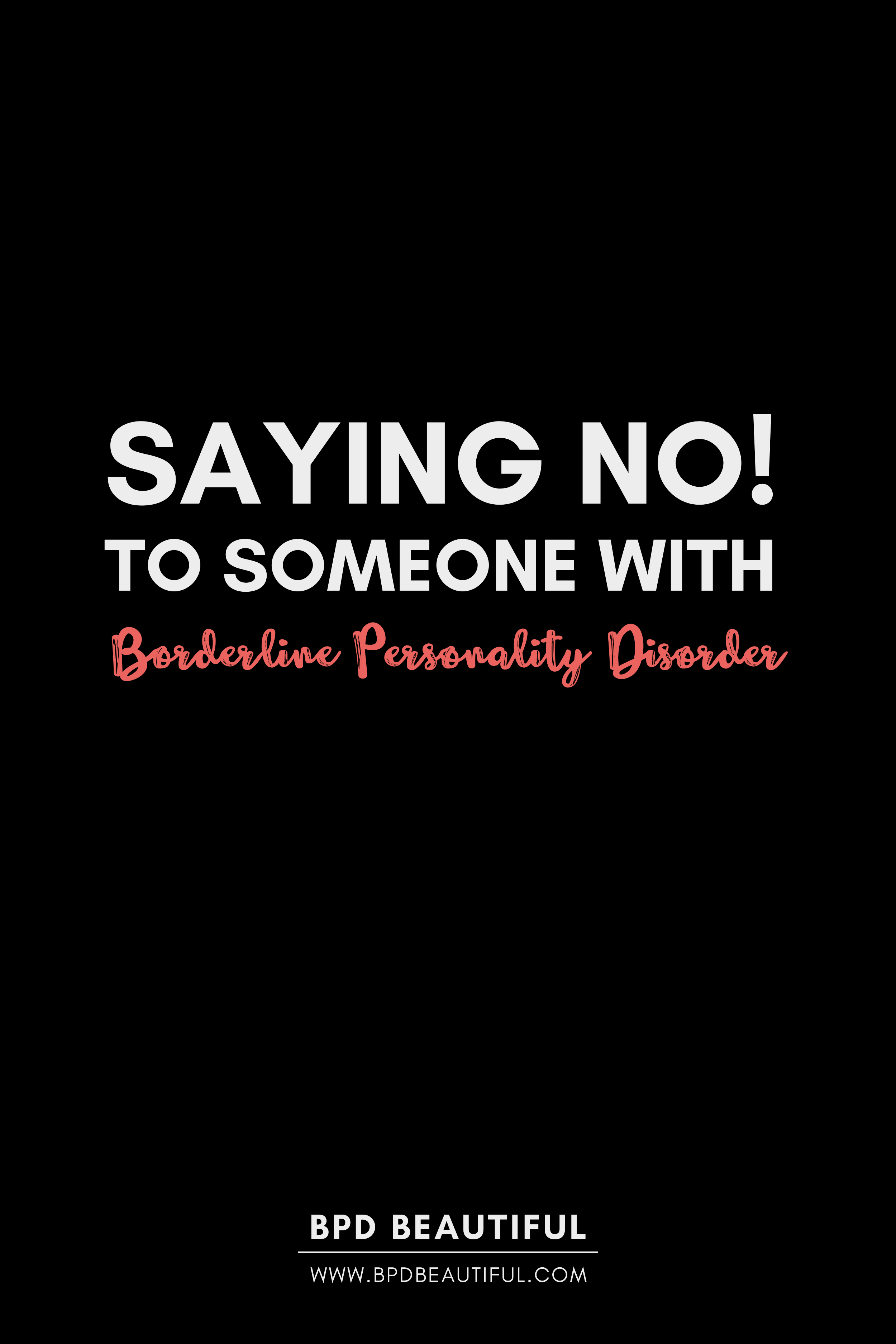


Comments
One response to “Saying No to Someone with Borderline Personality Disorder”